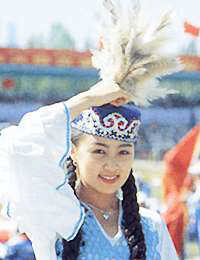 With a population of 1,111,718 (as of 1990), the Kazak ethnic minority is distributed mainly in the Xinjiang Ili Kazak Autonomous Prefecture, and Mori and Barkol Kazak autonomous counties. In addition, they also live in Gansu and Qinghai provinces.
With a population of 1,111,718 (as of 1990), the Kazak ethnic minority is distributed mainly in the Xinjiang Ili Kazak Autonomous Prefecture, and Mori and Barkol Kazak autonomous counties. In addition, they also live in Gansu and Qinghai provinces.
The Kazak language belongs to the Turkic Austronesian of the Altaic Phylum. As the Kazaks live in mixed communities with the Hans, Uygurs and Mongolians, the Kazaks have assimilated many words from these languages. They had a written language based on the Arabic alphabet, which is still in use, but a new Latinized written form was developed in 1954.
The Kazak ethnic minority has a long history. They are the descendants of the ancient Wusun tribes. These tribes were driven from their homelands in the Hexi Corridor, but became an established power in the Ili region by the first century BC. Ancient Kazak people also had close relations with many other nationalities. In the mid-15th century, the Kazaks set up their own state.
Except for a few settled farmers, most of the Kazaks live by animal husbandry. They migrate to look for pasturage as the seasons change. In spring, summer and autumn, they live in collapsible round yurts and in winter build flat-roofed earthen huts in the pastures. The Kazaks, men and women alike, are good horse riders. The famous Ili horse, praised as celestial horse, is their pride.
Their folk literature handed down orally was quite developed, such as old verses, tales, proverbs, parables and maxims. Many outstanding Kazak classic and contemporary works have been published in the Kazak language.
The Kazaks are now Muslims. Their festivals and ceremonies are related to religion. The Corban Festival, the Noroz Festival and the Id El-fitr Festival are occasions for feasts of mutton and mutual greetings. The Nawuruz Festival in the first month of the lunar calendar is a grand occasion to say good-bye to the old, usher in the new, and hope for a better year in stockbreeding.
